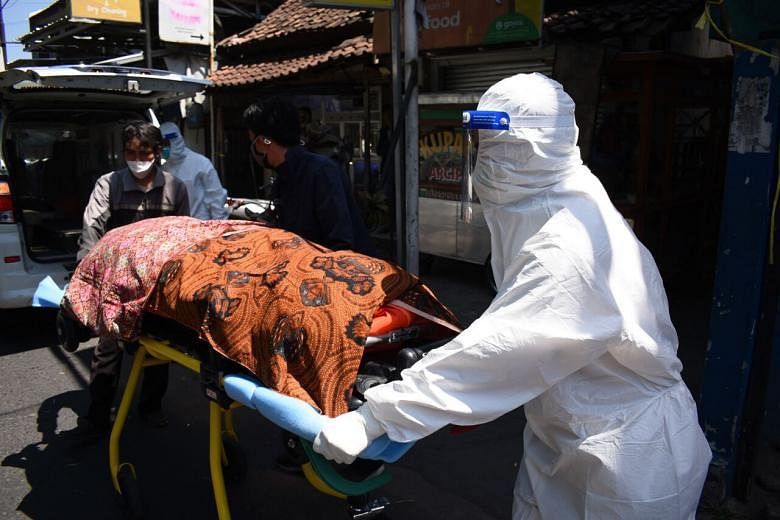JAKARTA (BLOOMBERG) - Indonesia has reached a grim milestone as more than 100,000 people died from the coronavirus, becoming the second country in Asia to breach that threshold.
After weeks of topping the world's tally of daily Covid-19 deaths, South-east Asia's largest economy added 1,747 fatalities on Wednesday (Aug 4), according to data from the Health Ministry, bringing its total number to 100,636.
Indonesia joins 11 other countries - including Brazil and India - that have lost more than 100,000 lives in the pandemic that began last year, showing how the world's epicentres for the virus is shifting beyond Europe and America to South-east Asia.
While Indonesia is adding fewer number of cases daily than the United States, its lower vaccination coverage and less-equipped healthcare system have led to higher mortality rates from the virus.
Just 8 per cent of Indonesia's 270 million population are fully inoculated, compared with more than half in the US, according to Bloomberg's vaccine tracker.
The death toll has risen frighteningly fast for Indonesia. More than a third of fatalities were recorded in July alone, when the highly transmissible Delta variant took hold, overwhelming hospitals and depleting the supply of much-needed oxygen tanks.
Most of the deaths were due to late treatment, as healthcare facilities could take in only the sickest patients despite setting up beds across carparks and converting apartment buildings into isolation centres.
At least 2,837 people have died while isolating at home or outside hospitals, as the government urged only those with severe cases to come to the overburdened health facilities, according to data compiled by crowdsourcing platform LaporCovid19.
Beyond Java
In early July, the government imposed its strictest set of movement limits on the most populated island of Java and tourist destination Bali to curb the spread of the virus, before expanding similar restrictions to the rest of the country.
Daily cases have since eased from the peak reached on July 15, especially in capital Jakarta that had long been the local virus hot spot. Infections are now spreading through provinces beyond Java, including in East Kalimantan and Riau.
Indonesia seeks to quicken its vaccine roll-out with a target of administering 2.5 million doses a day this month and the next, more than double the rate in July.
Lack of supply remains the key hurdle.
The majority of Sinovac shots it is relying on needs to be cultured from the bulk doses shipped by the Chinese manufacturer, a process that can take one to two months. The country is just starting to receive shipments of Pfizer and Moderna shots through Covax and bilateral deals.
As other countries grapple with vaccine hesitancy, most Indonesians are eager to be inoculated but lack access.
Among those who have not had their shots, 80 per cent said they are waiting for a slot, are looking for available doses or have not been able to get the jabs for various other reasons, such as health conditions or lack of transport.
More than 65 per cent of those who have been vaccinated said they did so out of personal choice, followed by 31 per cent who were told to by their workplace or other figures of authority, according to a July survey by the statistics agency.











